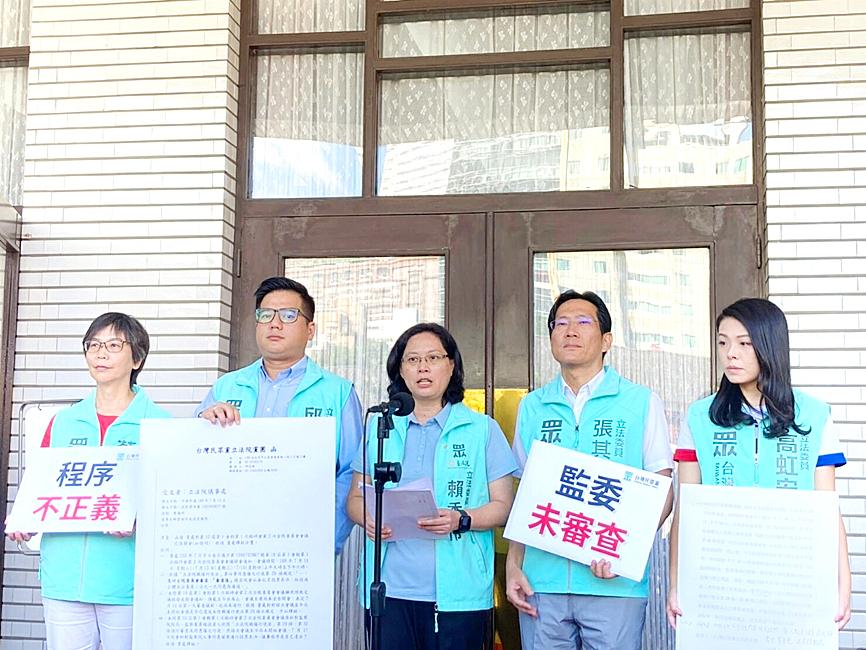The Taiwan People’s Party (TPP) caucus yesterday decried the legislature’s confirmation of former Presidential Office secretary-general Chen Chu (陳菊) as Control Yuan president, saying that the party would file for a constitutional interpretation on the legality of the approval of her and 26 other Control Yuan nominees by Democratic Progressive Party (DPP) legislators.
The TPP legislators made the remarks after the Legislative Yuan earlier in the day approved President Tsai Ing-wen’s (蔡英文) appointment of Chen in a 65-3 vote, with two votes invalidated. The DPP has a majority in the 113-seat legislature.
TPP caucus whip Lai Hsiang-ling (賴香伶) said that her caucus on Wednesday sent the Legislative Yuan Conference Department a letter asking whether the review of the nominees’ qualifications should be deemed valid given that it had ground to a halt.

Photo courtesy of the TPP
However, there was no response, Lai said.
Legislative Speaker You Si-kun (游錫堃) failed to remain neutral on Thursday when he read the DPP’s motion to prematurely end the review amid chaos — a move that was clearly biased, she said.
The Legislative Yuan has turned a deaf ear to calls from the TPP and the New Power Party (NPP) caucuses for the vote on the nominees to be held after their qualifications were adequately reviewed, she said.
The TPP believes that the flawed process warrants a constitutional interpretation, which it would seek from the Council of Grand Justices, Lai said.
If the council rules against yesterday’s vote, the investiture of Chen and the other nominees would be repealed, she said.
Earlier yesterday, before the vote, the NPP caucus told a news conference that You had become a rubber stamp for the ruling party by allowing a vote to be scheduled before proper review of the nominees’ qualifications could be completed.
The Constitutional Interpretation Procedure Act (司法院大法官審理案件法) stipulates that lawmakers may request a constitutional interpretation only if potentially unconstitutional elements manifest themselves while they are discharging their duties, so NPP lawmakers were to take part in the procedure by voting against the nominations, NPP caucus whip Chiu Hsien-chi (邱顯智) said.
The NPP, which holds three seats, said it would ask for a constitutional interpretation on whether the confirmations were valid, given that the nominees did not undergo the legally mandated review process.
The 27 Control Yuan nominees confirmed yesterday are to begin their roles on Aug. 1, and would serve six-year terms.
Additional reporting by Wu Su-wei and CNA

MAKING WAVES: China’s maritime militia could become a nontraditional threat in war, clogging up shipping lanes to prevent US or Japanese intervention, a report said About 1,900 Chinese ships flying flags of convenience and fishing vessels that participated in China’s military exercises around Taiwan last month and in January have been listed for monitoring, Coast Guard Administration (CGA) Deputy Director-General Hsieh Ching-chin (謝慶欽) said yesterday. Following amendments to the Commercial Port Act (商港法) and the Law of Ships (船舶法) last month, the CGA can designate possible berthing areas or deny ports of call for vessels suspected of loitering around areas where undersea cables can be accessed, Oceans Affairs Council Minister Kuan Bi-ling (管碧玲) said. The list of suspected ships, originally 300, had risen to about 1,900 as

DAREDEVIL: Honnold said it had always been a dream of his to climb Taipei 101, while a Netflix producer said the skyscraper was ‘a real icon of this country’ US climber Alex Honnold yesterday took on Taiwan’s tallest building, becoming the first person to scale Taipei 101 without a rope, harness or safety net. Hundreds of spectators gathered at the base of the 101-story skyscraper to watch Honnold, 40, embark on his daredevil feat, which was also broadcast live on Netflix. Dressed in a red T-shirt and yellow custom-made climbing shoes, Honnold swiftly moved up the southeast face of the glass and steel building. At one point, he stepped onto a platform midway up to wave down at fans and onlookers who were taking photos. People watching from inside

Japan’s strategic alliance with the US would collapse if Tokyo were to turn away from a conflict in Taiwan, Japanese Prime Minister Sanae Takaichi said yesterday, but distanced herself from previous comments that suggested a possible military response in such an event. Takaichi expressed her latest views on a nationally broadcast TV program late on Monday, where an opposition party leader criticized her for igniting tensions with China with the earlier remarks. Ties between Japan and China have sunk to the worst level in years after Takaichi said in November that a hypothetical Chinese attack on Taiwan could bring about a Japanese

The WHO ignored early COVID-19 warnings from Taiwan, US Deputy Secretary of Health and Human Services Jim O’Neill said on Friday, as part of justification for Washington withdrawing from the global health body. US Secretary of State Marco Rubio on Thursday said that the US was pulling out of the UN agency, as it failed to fulfill its responsibilities during the COVID-19 pandemic. The WHO “ignored early COVID warnings from Taiwan in 2019 by pretending Taiwan did not exist, O’Neill wrote on X on Friday, Taiwan time. “It ignored rigorous science and promoted lockdowns.” The US will “continue international coordination on infectious